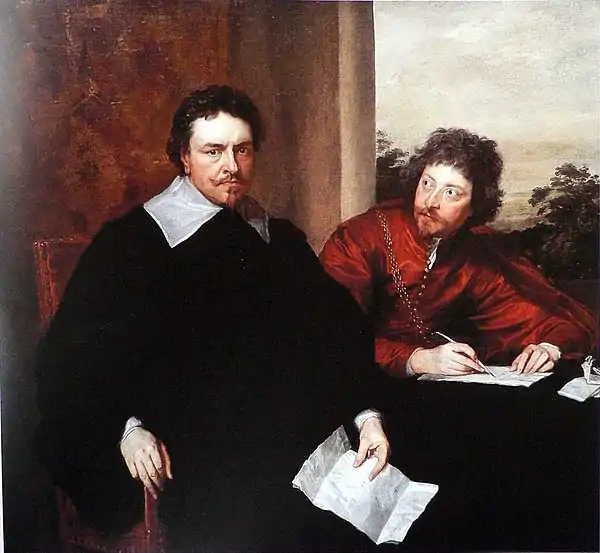Philip Mainwaring
Sir Philip Mainwaring (1589 – 2 August 1661) was an English politician who sat in the House of Commons variously between 1625 and 1661.
Mainwaring was the seventh son of Randall Mainwaring, of Peover, Cheshire and Margaret Fitton, daughter of Sir Edward Fitton (the elder) of Gawsworth Old Hall and Ann Warburton. He was admitted at Gray's Inn on 14 March 1609, and matriculated at Cambridge from Brasenose College, Oxford on 29 August 1610. He was awarded BA from Oxford in 1613 and entered Lincoln's Inn on 15 February 1614. In 1624 he was awarded MA at Cambridge on visit of King Charles.[1]
Mainwaring was elected Member of Parliament for Boroughbridge in 1625 and 1626. He was elected MP for Derby in 1628 and sat to 1629 when King Charles decided to rule without parliament for eleven years.[2]

In 1634 Mainwaring became Principal Secretary to the Lord Deputy of Ireland, Lord Strafford. Strafford's biographer refers to him as a "court hanger-on" who was disliked by many of Strafford's friends, but who had provided him with useful intelligence in the past, and who justified the Earl's trust by proving a diligent and loyal official, who remained faithful to his employer.[3]
He was knighted at Dublin Castle on 13 July 1634. He was an MP in the Irish House of Commons for Clonakilty from 1634 to 1635 and for Carysfort from 1640 to 1641.[1]
Mainwaring was elected MP for Morpeth for the Short Parliament in April 1640.[2] He was imprisoned as a staunch Royalist in 1650.
After the Restoration of Charles II he applied unsuccessfully for the position of headmaster of Charterhouse School. In December 1660, Mainwaring was appointed to the Irish Privy Council. It was suggested that given his advanced years he should step down from his old office as Principal Secretary, but he held on firmly to his place. He was then elected MP for Newton in the Cavalier Parliament in 1661, but died later that year. He never married.[4]
References
- "Mainwaring, Philip (MNRN624P)". A Cambridge Alumni Database. University of Cambridge.
- Willis, Browne (1750). Notitia Parliamentaria, Part II: A Series or Lists of the Representatives in the several Parliaments held from the Reformation 1541, to the Restoration 1660 ... London. pp. 229–239.
- Wedgwood, C.V. Thomas Wentworth, 1st Earl of Strafford 1593-1641- a revaluation Phoenix Press reissue 2000 p.135
- Leigh Rayment's Historical List of MPs – Constituencies beginning with "N" (part 2)
- Charles Arnold-Baker, The Companion to British History, London 2001, p. 845 (online at google books)
- http://www.leighrayment.com/pcouncil/pcouncilI.htm
| Parliament of England | ||
|---|---|---|
| Preceded by William Mainwaring Sir Ferdinando Fairfax |
Member of Parliament for Boroughbridge 1626–1628 With: Sir Ferdinando Fairfax |
Succeeded by Sir Ferdinando Fairfax Francis Neville |
| Preceded by Sir Henry Crofts John Thoroughgood |
Member of Parliament for Derby 1628–1629 With: Timothy Leeving |
Vacant No Parliaments summoned until 1640 Title next held by William Allestry |
| Preceded by John Vaughan Richard Legh |
Member of Parliament for Newton June–October 1661 With: Richard Legh |
Succeeded by Richard Legh The Lord Gorges of Dundalk |
| Parliament of Ireland | ||
| Preceded by Sir Edward Harris Henry Gosnold |
Member of Parliament for Clonakilty 1634–1635 With: Sir Robert Travers |
Succeeded by Sir Robert Travers Peregrine Banastre |
| Preceded by Walter Loftus Francis Crosbie |
Member of Parliament for Carysfort 1640–1641 With: Francis Crosbie |
Succeeded by Protectorate Parliament |